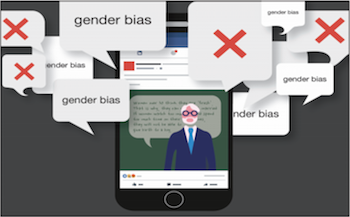
With the rising occurrences of gender-discriminatory language being used on campus, many students are taking matters into their own hands, while university policies are changing to regulate such language, especially in the classroom.
Recently in Chungang University, a professor was denounced by the public due to his biased comments in class.
“School? It’s a division of function,” the professor said, according to Daily UNN. “School president, professors, students and coffee-selling girls: what are all these? They are division of function.”
His example of “coffee-selling girls” caused an uproar online for its disparagment of café workers. He used this example while explaining the sociology term division of function.
After the professor’s comments spread across the Internet, Chungang University’s students and faculty demanded heavy punishment upon the professor, insisting that the comment belittled the social status of women.
Also, a professor from University of Seoul was dismissed on disciplinary grounds due to his comments directed at women.
“Women over 30 think they are still ‘fresh’; that is why they never get married,” the professor commented during class, according to students. “If women watch too much TV and spend too much time on their cell phones, they will not be able to give birth to a boy.”
Both of these incidents happened on campus in April. However, it is not the first time that gender-discriminatory language on campus caused a public outrage. According to a survey by Albamon, 57.9 percent of university students agreed that there is sexual discrimination on campus. Moreover, 57.6 percent of university students who claim to have experienced gender discrimination answered that it was their professors who displayed such behavior.
Although both professors accused of sexually-biased issues resigned or were dismissed by the council, there were moves to lighten the professors’ penalties. For example, University of Seoul first tried to warn the professor to reveal his name instead of giving him an actual punishment. In response to these actions students have expressed strong objections.
To solve this endemic problem on campus, some universities are trying to increase the opportunities to report improper statements made during class. Starting this semester, Hanyang and Sungkyunkwan University have decided to add questions on the lecture evaluation questionnaires about the professor’s use of gender-biased language.
Both universities’ questionnaires guarantee anonymity and aim to give prompt feedback to students. For example, when a report is registered, Sungkyunkwan’s school affairs team immediately demand feedback from the accused professor. With this reform, students of these universities are expecting a positive change.
“I think it could remind professors about their unconsciously made sexual discriminatory comments during class,” stated a student from Sungkyunkwan University. “Adding this question could draw more attention to this severe issue.”
Students are also taking action to prevent and bring light to such verbal violence made by their professors. In addition to student councils, where students’ opinions have traditionally been conveyed, accusation clubs newly surged to directly demand professors to stop using gender-biased words.
One example of these accusation clubs is Hanyang University’s anti-sexual violence and gender discrimination club, Woldam. Woldam has been uploading their professors’ biased comments on SNS and issuing statements about sexually-biased comments that were hidden on campus. The aim of these programs is to easily publicize professors’ biased statements, which are difficult to reveal due to authoritarianism on Korean campuses.
They started working as an accusation club in 2011 when professor of the course “Understanding of Sex” used inappropriate lecture materials and statements such as claiming sexual violence to be a natural instinct of men. After condemning the incident, Woldam noticed that there were many unrevealed cases that had happened on campus and sought to raise awareness of these biased statements.
“Usage of misogynistic language on campus is very harmful for society as well as students,” Woldam said. “Statements used by our professors are especially critical because of their credibility. Therefore, for a better future, discriminatory language should be eliminated from university campuses.”
As concerns of derogatory language and behavior against female students continue to create problems on campus, universities and students are endeavoring to resolve the issue and demand changes.
“I’m glad universities are starting to acknowledge these issues, and students are trying to make their voices heard,” said Ro So-jeong, a freshman in the Department of Communication and Media at Ewha. “Still, more actions are needed that we, the university and students, have to take in order to deal with remaining weak points on campus.”

